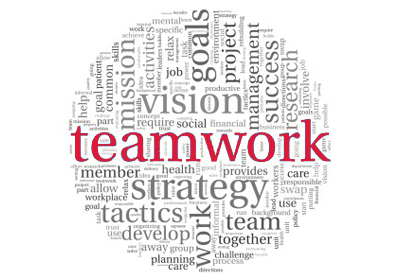
Teamwork has become the default way of working in organisations. Many of us have a long-lasting romance with teams, yet we rarely stop and question the assumptions. Like breathing, we just do it. Is teamwork still a safe bet or is it ‘last century’?
The benefits of teams
- It is an easy, structured way to manage people. In a classic hierarchy there is a span of control that provides the boundaries for typical team sizes (3-12). Each team has a team leader or manager, who then reports to a manager who has a number of teams reporting into him or her, and so on.
- Teams provide a solid foundation for thinking, problem solving, idea generation and innovation: two heads, or more, are often better than one.
- Teams (of certain sizes) have easier access to funding and budgets and thrive on economies of scale. They are likely to pull off what individuals can’t.
- Teams fulfil a fundamental human need for belonging. All human cultures form groups in one way or another and most people have a strong need for both social, emotional and competence-based bonding. In a work environment this may be partially fulfilled by belonging to a team.
- Teams can be lots of fun to work in, and sometimes almost like an extension of your family.
Drawbacks to teams
However, teams often don’t perform better than the sum of the individuals. This can be for many reasons, such as:
- the team is not managed well (especially for highly diverse teams).
- non-optimal composition of the team.
- no compelling direction, and lack of empowerment.
- personal conflicts or conflicts regarding decision making processes and who does what.
- bad or inappropriate structure and size.
- lack of a supportive context.
Does your team suffer from at least one of these? Think of IT resources and tools you are using in your daily work. How many of these tools are really geared specifically towards working with your team? How well are you, as a manager, trained to manage a diverse group of different individuals?
Do members of your team have the ability to challenge each other, speak up and share information? Companies often test and interview specifically to ensure a potential employee “fits” and is not too different. There is some evidence that teams foster ‘groupthink’ and compliance, in which case teams fail in their decision-making and provide incomplete alternatives or data.
The dream team
So what is the dream team of the future? Teamwork does not suit everybody and can lead to social ostracism end exclusion, with dire consequences for those involved. But how many people can really choose to work outside a team? Organisations are often wedded to a teamwork ideology. It is just ‘the way things are done’ and how we are socially trained to think – isn’t it?
But, in the case of teamwork, there are trends in society that may change the way we think, the most important being the internet and its applications. ‘Two heads are better than one’ assumes that heads (people) hold information. Of course they do, but in today’s wired world a big part of the information we use in our daily work has relocated from heads to nets. You can find it either online by using search engines, or via networks that people are more or less loosely connected to (such as Facebook or LinkedIn).
Our job is increasingly a matter of finding, transforming and (critically) processing information that is more or less readily available. This is often done most effectively by individuals, whereas ‘sensemaking’ and discussion of possible implications and priorities can best be done in teams.
The new generation
The new generations like to form their own teams, networks, LinkedIn groups and so on. They need freedom and support for different ways of working, and inspiration and guidance instead of commands and restrictions. Organisations therefore need to support the natural creation of informal ‘teams’ based on interests and personality.
‘Communities of practice’ are a good example of contemporary teams. These are groups of people (inside or across organisations) who share a concern or a passion for something they do (eg specific software or marketing techniques) and learn how to do it better as they interact regularly. These communities do not have to be concerned only with technologies. They can also deal with business or societal issues that occupy the minds of many people today, for example social responsibility, environment or ecology.
The challenge is to modernise team work and processes, and to find the right balance between established teams inside an organisation and fluid open collaborative teams spanning organisations, disciplines and boundaries.
Adapted from an article by Karsten Jonsen, a Research Fellow at IMD, a leading global business school based in Lausanne, Switzerland


About The Author: Amanda Baines
Amanda has a passion for turning ‘average’ into ‘excellent’. She delivers outstanding results through her dynamic coaching, consultancy and facilitation, producing organisations which maximise everyone’s potential and in which everyone plays to their strengths.
More posts by Amanda Baines